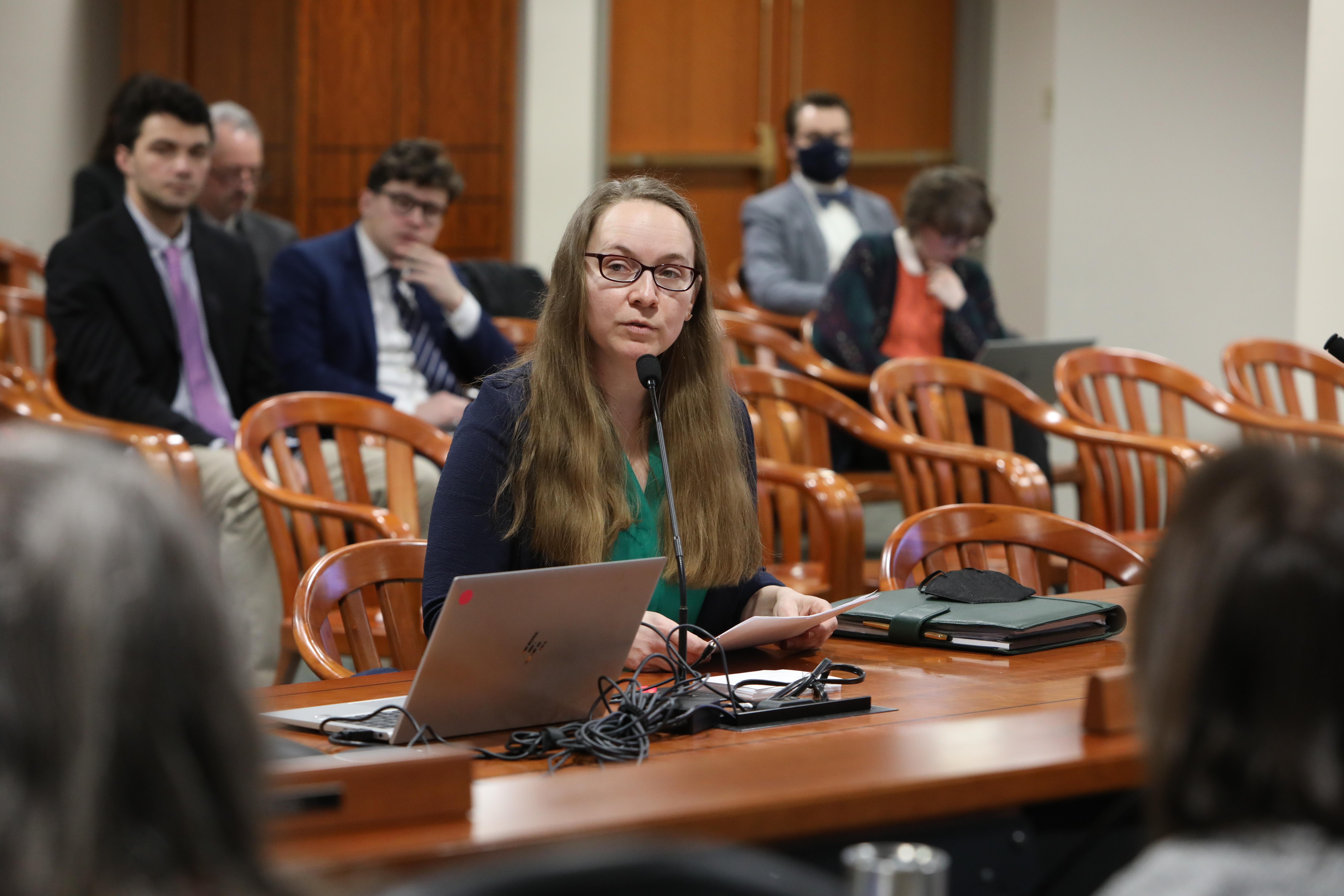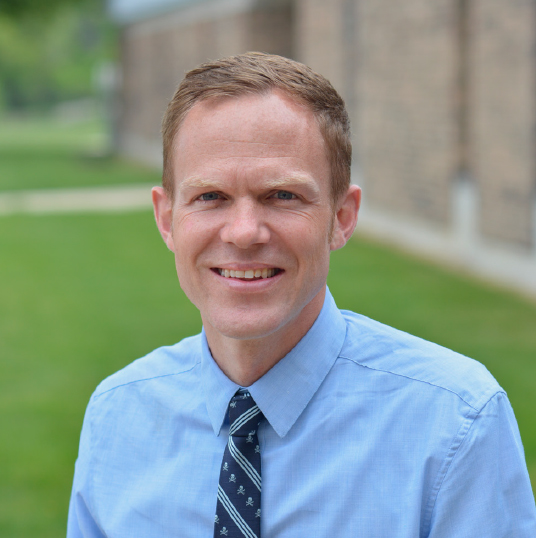MEA Members Share Reasons Behind Educator Shortages
Several MEA members, including Michigan Teacher of the Year Leah Porter, testified last week at a hearing on the varied causes behind growing educator shortages before the Appropriations Subcommittee on School Aid and Department of Education.
The subcommittee, chaired by Rep. Brad Paquette (R-Niles), heard wide-ranging explanations for why educators are leaving the profession and not enough young people are completing preparation programs to replace them, including declining compensation, lack of respect, and inadequate resources.
Watch the full video of testimony from MEA and AFT Michigan members – and then add your voice to the discussion.
Rep. Paquette asked for more perspectives from front line educators on this critical subject. MEA is providing this easy-to-use form to send the subcommittee leadership an email with your thoughts, ideas and experiences.
Following are excerpts from Thursday’s testimony, lightly edited for space and clarity.
Leah Porter > third-grade teacher > Holt > 16 years

As Michigan Teacher of the Year this year, I have had the opportunity to visit many schools and speak with teachers across the state about their experiences over the last few years. This unique opportunity has left me in total awe at the incredible educators we have in Michigan. But what I have seen and heard is the current teaching environment has become endlessly exhausting with no relief in sight. For years, the educational system in Michigan could be seen as a cracking dam – years of neglect and under-funding stripping away at its strength. The pandemic has now caused this dam to break. And we’re going to see and feel the impact of decisions that have been made and are being made right now for years to come.
It is heart-wrenching to know we have phenomenal educators across the state and many are feeling so overwhelmed and unheard and saying they don’t know how much longer that they can do this. School professionals are not OK. The challenges, stress, and pressure of this school year have far surpassed the previous pandemic teaching year in ways that were impossible to fathom last summer. While the past two years have had so many hurdles, the crisis in schools has been brewing for a long time. Years of funding cuts, loss of pension and affordable insurance, consolidation of staff, additional work responsibilities from absorbed positions, and the perpetual attacks on education systems have created the perfect storm we are now facing.
Educators are resilient and creative problem solvers. They have been keeping this educational system afloat for years as it has been crumbling around them. Teachers don’t ask for much. They care tremendously for their students, and they are in this profession because they care about the future of not only the children in front of them but also those still to come. There has never been a more critical time to support educators. Respect them, trust them, recognize the very real challenges that those in schools are facing each day. Show educators you see and hear them through your actions, the expectations that you’re putting on educators, and through your support. The welfare of teachers depends on it. The structure of our school systems depend on it. And the children of Michigan deserve well-funded structures in which to learn and thrive.
Luke Wilcox > high school math teacher > Kentwood > 21 years

In 2018, as Michigan Teacher of the Year, I had the opportunity to visit classrooms all around the country, and one in California had a big impact on me. I visited a Grow Your Own program called Ed Rising in a community that was mostly Hispanic with teachers that were mostly white. The students were putting together lesson plans, thinking about teacher moves, and I was so inspired that I came back home and had a look at Kentwood as a whole and East Kentwood High School in particular. We’re the most diverse public high school in the state of Michigan. But the teachers at East Kentwood High School are over 95% white, which means our students are not seeing themselves at the front of the room. Research has shown that minority students who have at least one minority teacher perform better academically and are more likely to attend college.
I went to my administration and said, “I’d really love to get this going at East Kentwood High School.” Now three years later, this is the third season we have had EdRising. I reached out to the current teacher, Jasmine Ramahi, to see how things are going. She said the students in the class represent the diversity of the larger student population, which was one of the big goals. And she has taken the students through a rigorous curriculum that has a focus on equity in education. She is getting these students into elementary and middle school classrooms to observe teachers. She’s also taking them to local universities and working to make partnerships to help students with scholarship opportunities for those who choose to go into education.
I’m sure you’re all aware that the [governor’s] current budget proposal includes $150 million for Grow Your Own programs like EdRising. And I certainly hope the story of what’s happening at East Kentwood High School will help you all to be in support of these programs.
Danielle Groendyk > high school English teacher > Oakridge > 3 years

I’ve seen a lot of my peers that I graduated college with who are no longer teaching. They were great educators, but they’re moving on to other things for a variety of reasons. With the right support, maybe they would have stayed and had a chance to make a difference in the lives of children. When asked why they’re leaving, some of them mentioned the stress of the job and the impact on their mental health. Others have indicated the workload is not sustainable, myself included. Others have left teaching to pursue other fields where they’re better compensated and have a better work-life balance.
What can be done to better support teachers? The first is to release some of the burdens required to become an educator. Between the high cost of college, the unpaid student teaching experience, and the modest starting salaries, we put a lot of burden on new teachers. Anything that the state could do to relieve that financial burden would tremendously help, from scholarships to paying student teachers stipends, etc. Making these changes could attract more people into teaching, and put them in a better position to succeed once they graduate.
I would also say more work could be done to better support students. This includes counselors, social workers, nurses, substitute teachers, and support to lower class sizes. My district, and I’m assuming many districts in general, really struggle with substitutes, so we give up our planning time very often having to cover classes because we don’t have other adults in the building who can. When teachers are supported, children are supported likewise. And when our children are thriving, teachers are more able to do incredible things in the classroom.
Diane Rodolfo > First-grade teacher > Grand Rapids > 20 years

To succeed in the teaching profession requires physical and mental endurance, strong time management skills, constant flexibility, and many other skills to manage behavior, plan effective and engaging lessons, provide ongoing assessment, feedback, and reflection. Social worker, nurse, and organizational managers are some of the other hats we wear. And since COVID, many of us are doing custodial duties due to lack of custodians across the district… Love of learning and children is not driving away our teachers. The myriad of responsibilities and harsh realities that take away time and energy needed for our lessons and for student interactions contributes to this teacher shortage.
Disruptive behaviors have increased steadily in our classrooms. New teachers have left our profession because of ongoing behavior concerns such as students throwing chairs, knocking down tables, hitting, and kicking. Many districts do not have the funds to provide needed help for struggling students. We share a social worker, who is in our building one day a week. There is a long wait list for students to be seen by our social worker. Many of our students will not receive the much-needed support that she can provide.
Another reason why I truly believe teachers are leaving the district is our evaluation system, which is not appropriate for the realities we see in our classrooms, and it certainly is not appropriate for all grade levels. In Grand Rapids public schools, we have the highest poverty in Kent County. As a high-needs district, we have inadequate funding, our resources are limited, and our test scores are lower than some neighboring districts. Why would a new teacher stay in a profession that evaluates them in this manner?
Craig Christensen > middle school English teacher > Whitehall > 27 years

One of the major changes in the past 10 years is the volume of young people dealing with crippling anxiety and trauma. These kids show up with debilitating issues, and schools lack the manpower and resources to address them all. We front-line teachers do our best, but what has changed is that for many of us, our best isn’t enough. Moving forward, we must be mindful about what we’re requiring of the teaching profession and also how we talk about the teaching profession. Our veteran educators are experiencing burnout, and new teachers struggle to gain their footing.
We need to build better mental health support systems for students. Teachers cannot do this work alone. We need to increase the number of talented young people committing themselves to education and compensate them. Our district here in Whitehall is trying to hire staff to fill this need but credentialed and qualified staff are few and far between. We should consider scholarships, stipends for student teachers, and better mentoring programs. We need to make the career of teaching much more attractive to talented young people.
My 19-year-old daughter declared her major last December. She chose education like her mom and dad. That same month, she attended her first school board meeting. What she saw was horrifying: people on the attack, shouting one another down, naming teachers and slamming them. Not surprisingly, she’s now questioning whether she wants to subject herself to the realities of being a teacher… We need to change the conversation and support structures for teachers so intelligent people like my daughter might be inspired to carry out her family legacy of teachers and our nation’s legacy of public education.




This is a great article. But the teachers interviewed are not diverse. No SPED, principals, or paras were interviewed or considered. All students are more at risk since the pandemic, that has flooded ALL school’s tier 2 and tier 3 systems. That is where the dam has been ‘for lack of a better word’ obliterated.
That is EXACTLY what I thought when I read this article! With diversity comes a more nuanced understanding of the issues that everyone is experiencing.
Hi, Mandy – this is Brenda Ortega, editor of the Voice. I probably should have made clearer in the article that this hearing was not announced far in advance. The notice came late, and only a few people heard about it and were able to sign up and zoom in. That’s why we’re strongly pushing for more members to use this form to send written testimony to the committee… please share the word: https://secure.ngpvan.com/aR9uZ_R6n020bOB_-JqtfQ2
Teachers should be able to afford to live in the communities they teach in.
I am amazed that none of them mentioned the lack of support from parents, along with the many educationally crippling laws that are being initiated that want to control what educators teach in areas like history, science, and gender. I taught for 39 years and retired in 2010. In those years I saw dramatic changes in student behavior and parental support. Administrators were pushing teachers to pass students even though they were failing. That was 10-15 years ago! Now we have political issues and people like Ms. DeVos who are trying to stir up descent towards public education and pushing charter schools which are not held to the same standards as public schools. Education for profit.
I have been teaching for over 25 years and the last 10 years have been extremely difficult. Our district froze our salaires, cut our benefits and made us pay more them and the state changed our retirement. My class sizes are huge and the work load is overwhelming. Then we have to add in meaningless and time consuming evaluations that did nothing to help improve teaching, excessive testing and a total lack of respect for teachers. I come home every day exhausted. Experienced teachers need more money and support as well as new teachers. I wish that legislators who know nothing about education would quit making laws about education.
The line between keeping students engaged and keeping them entertained has been blurred.